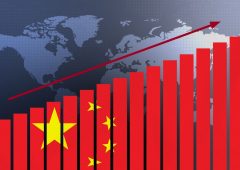Are Emerging Economies Poised to Dethrone the Dollar?
26.09.2024 19:00 2 min. read Alexander Stefanov
Former U.S. Treasury Secretary John Connally, who served under President Richard Nixon, famously remarked that "The dollar is our currency, but that's your problem."
This statement reflects the dollar’s dominant position in global finance, a status the U.S. has effectively exported worldwide. However, in recent years, emerging economies have begun a concerted effort to de-dollarize, aiming to diminish the dollar’s global influence and making it more of an American concern rather than an international one.
While the U.S. dollar still plays a critical role in global finance through remittances, currency exchanges, and international trade, it continues to overshadow other currencies.
Most global transactions occur in dollars, which often sidelines alternative currencies. Despite initiatives aimed at reducing reliance on the dollar, it remains a dominant force in financial markets.
The push for de-dollarization is particularly evident among developing nations like China, Russia, Brazil, South Africa, and India. These countries are striving to lessen their dependence on the U.S. dollar and promote their own currencies to bolster their economies.
This trend aligns with a perceived decline in U.S. influence globally, as many emerging markets are now achieving higher GDP growth rates than the U.S. and its Western allies. For these nations, moving away from the dollar is seen as a long-term strategy rather than a temporary shift, intensifying the scrutiny on the dollar’s stability.
Should these efforts prove successful, the next decade could usher in significant changes to the global financial landscape. The dollar might weaken, leading to a rise in the strength of local currencies. Such a transformation could have profound implications for various sectors within the U.S., emphasizing the potential economic repercussions of de-dollarization.
-
1
Warren Buffett Narrows His Bets as He Prepares to Step Down
14.06.2025 16:00 2 min. read -
2
Why Gold Could Be the Smart Play Amidst US Debt Surge
11.06.2025 11:00 1 min. read -
3
MEXC Sets Up $100M Emergency Fund to Protect Users From Major Security Incidents
12.06.2025 11:00 1 min. read -
4
NFTs Quietly Evolve Into Core Digital Infrastructure
13.06.2025 17:00 2 min. read -
5
Peter Thiel-Backed Bullish Quietly Files for IPO as Crypto Firms Eye Wall Street
11.06.2025 22:00 1 min. read
Key U.S. Events to Watch This Week That Could Impact Crypto
The first week of July brings several important developments in the United States that could influence both traditional markets and the cryptocurrency sector.
Here Is How Your Crypto Portfolio Should Look Like According to Investment Manager
Ric Edelman, one of the most influential voices in personal finance, has radically revised his stance on crypto allocation. After years of cautious optimism, he now believes that digital assets deserve a far larger share in investment portfolios than ever before.
GENIUS Act Could Reshape Legal Battle over TerraUSD and LUNA Tokens
In the case involving Terraform Labs and its co-founder Do Hyeong Kwon, the defense has asked the Federal Court for the Southern District of New York to extend the deadline for pretrial filings by two weeks, pushing it beyond the original date of July 1, 2025.
Coinbase Surges 43% in June, Tops S&P 500 After Regulatory Wins and Partnerships
Coinbase has emerged as the best-performing stock in the S&P 500 for June, climbing 43% amid a surge of bullish momentum driven by regulatory clarity, product innovation, and deeper institutional interest in crypto.
-
1
Warren Buffett Narrows His Bets as He Prepares to Step Down
14.06.2025 16:00 2 min. read -
2
Why Gold Could Be the Smart Play Amidst US Debt Surge
11.06.2025 11:00 1 min. read -
3
MEXC Sets Up $100M Emergency Fund to Protect Users From Major Security Incidents
12.06.2025 11:00 1 min. read -
4
NFTs Quietly Evolve Into Core Digital Infrastructure
13.06.2025 17:00 2 min. read -
5
Peter Thiel-Backed Bullish Quietly Files for IPO as Crypto Firms Eye Wall Street
11.06.2025 22:00 1 min. read


